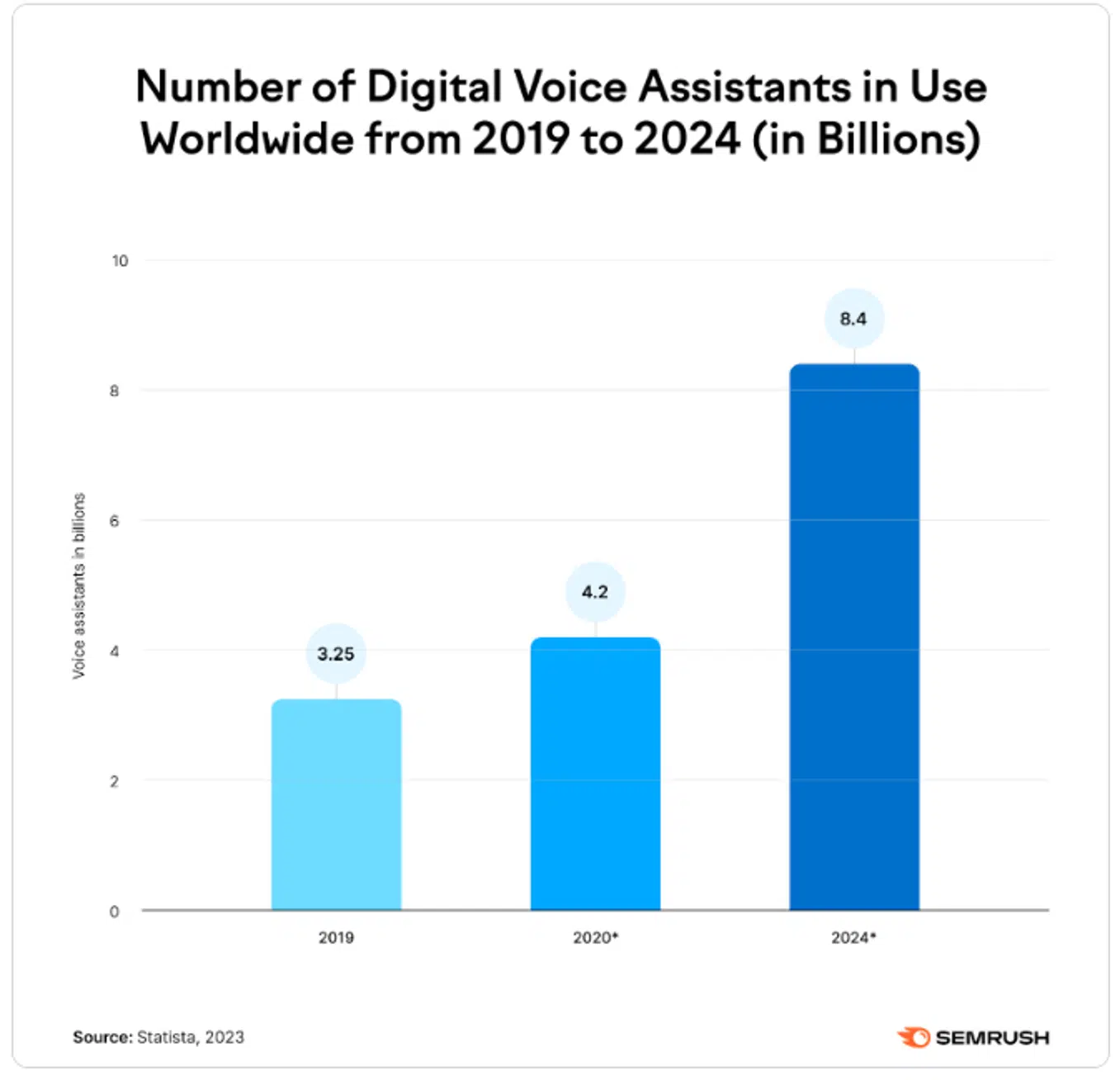[ad_1]
“OK, Google. What is voice search?”
“Hi, Trish. Voice search means optimizing your website for voice search queries. The goal of voice search optimization is to make your content more likely to appear in voice search results.”
If you’d asked me a year ago about voice search, I would have thought of my Alexa Echo or Google Home device. Now I just think about speaking out loud to whatever device is near me.
My phone, watch, voice assistant, or browser – even taking notes for this article – now I’m more inclined to speak it.
The evolution of voice search
When we think about how voice search will be used in the future, it’s not necessarily how I’m using it but looking at how the next generations are using it.
My friends with kids tell me their kids use voice for most things. They aren’t asking questions only to Alexa or to their Google Assistant (or Gemini). They’re speaking to their smartwatch or whatever nearby device and asking the question.
With ChatGPT and other apps rolling out voice search, people will become even more comfortable utilizing voice for their queries. As mentioned in ChatGPT rolls out voice and image prompts, people are likely to engage and use ChatGPT in daily routines.
So, what do I think this means for voice search, and is it important in 2024? And how do we tell if it’s working if we don’t really have access to any data?
I think the data will come. What’s important is for marketers to be prepared for the shift.
Voice search adoption
Over 25% of individuals from Western countries indicated using digital voice assistants several times a day, per Statista.
This is likely to influence voice search capabilities in many ways, including:
- More voice data will allow voice assistants to analyze natural speech patterns, improving understanding of search queries. People have complained about inaccuracies, but we already see improvements with more data and adoption.
- Voice assistants will learn an individual’s tone, words, and phrases used in dictation, enabling more personalized and contextual voice search. Search results will become more personal.
- As people get comfortable speaking longer content, they may be encouraged to use more conversational long-form queries in voice search instead of just short commands.
- We can find long-form queries in GSC or other tools. And this can inform what a site needs to answer.
- People will come to expect their voice assistants to understand the context and intent behind queries based on past conversations, which will raise the expectations for results. If they run into issues, it may undermine their confidence in the results. Results will become more personal, with confidence easily lost.
In 2024, voice assistants are expected to reach 8.4 billion units. That’s more than the world population.


Over the past few years, the evolution of voice search has transformed how we interact with devices and the web. We can now ask questions and perform searches by simply speaking to smartphones, smart speakers, smartwatches, and even desktop computers.
Voice search is changing, seeing technological advances, and is impacting industries.
Younger users (Gen Alpha)
Younger users are using voice more often to find answers. They use it to navigate the internet and interact with technology. This is from the ease and speed with which voice commands can be used, combined with the growing number of smart devices in everyday life.
They also often use voice search for quick access to information – homework help, random facts, or quick answers in daily conversations.
They expect an immediate response for both instant gratification and efficiency. It can also be an interactive learning aid and help engage and assist students outside the classroom.
Voice assistants also offer interactive games, storytelling, and other entertainment options. Other uses include:
- Daily routines.
- Social interactions.
- Creating custom experiences, such as playlists or games based on previous activities.
Voice search lets any user multitask – finding information or performing tasks without interrupting current activities. Snap even has a bot you can converse with.
Younger users are embracing voice search and voice-assisted technologies as a natural and efficient way to access everything from education to entertainment to daily life management. It’s the next step in being digitally native (a voice native?). They don’t even need a keyboard or monitor.
Their adoption and innovative use of new technologies drive changes in how content is delivered, leading to a future where voice interaction is even more integrated into their digital experiences.


Changing user behavior
This all leads to more natural interactions. Improvements in natural language processing now allow for extended conversations between users and voice assistants/voice search.
As voice shifts toward more conversational tones and complex queries, search engines must adapt to interpret and deliver results for more nuanced questions.
This natural feel encourages regular use. And we need to be able to create content/optimize for those results.
Voice search provides convenience, especially when people are on the go needing hands-free functionality.
Speaking is faster than typing, appealing when users seek quick answers or multitask. That said, typing will still remain relevant – in public spaces or workplaces.
People may prefer typing to maintain privacy or avoid disturbing others. Typing will remain more discreet and should be used in areas where speaking aloud is not ideal.
Impact of voice search
I think voice search will start to change the SEO landscape.
Keywords are becoming more conversational, and I’m seeing longer long tail keywords in our report results – full sentences. This means providing answers for local searches, FAQ-style results, or other articles.
Voice search has also improved accessibility for people with visual impairments or other disabilities, giving access to information more easily.
Looking ahead
The future of voice search looks promising, with ongoing advancements in AI and technology expected to make it even more intuitive and integrated into our daily lives.
As voice search becomes more embedded in consumer behavior, industries will continue to evolve, adapting to the changing landscape of digital interaction and connectivity.
AI will continue to drive further innovations in search technology, leading to deeper integration into daily lives and tasks and a more personalized experience. It’s redefining the boundaries of what voice-activated systems can accomplish.
With the rise and importance of voice search, as marketers, we need to provide content that provides results for our business or clients. Still, with the difficulty of tracking results, it’s difficult to know if what is being done is working.
We can’t ignore it and must try adapting to it. We may or may not see tools like ChatGPT provide citations. People will use voice search for a quick answer and will go to a site if they want more in-depth information than what was provided in a quick answer or generated summary.
Despite how it seems voice search is changing the internet, what makes good quality sites and information, at least in my opinion, hasn’t changed that much. How we access it has, but what provides a good user experience hasn’t.
Good voice search optimization is good SEO. The best practice rules remain. Searchers want quick access to accurate, reliable information that answers their questions.
Opinions expressed in this article are those of the guest author and not necessarily Search Engine Land. Staff authors are listed here.
[ad_2]





